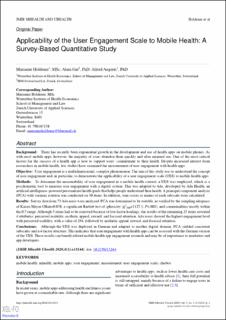Please use this identifier to cite or link to this item:
https://doi.org/10.21256/zhaw-19155Full metadata record
| DC Field | Value | Language |
|---|---|---|
| dc.contributor.author | Holdener, Marianne | - |
| dc.contributor.author | Gut, Alain | - |
| dc.contributor.author | Angerer, Alfred | - |
| dc.date.accessioned | 2020-01-23T13:59:23Z | - |
| dc.date.available | 2020-01-23T13:59:23Z | - |
| dc.date.issued | 2020-01-03 | - |
| dc.identifier.issn | 2291-5222 | de_CH |
| dc.identifier.uri | https://digitalcollection.zhaw.ch/handle/11475/19155 | - |
| dc.description.abstract | Background: There has recently been exponential growth in the development and use of health apps on mobile phones. As with most mobile apps, however, the majority of users abandon them quickly and after minimal use. One of the most critical factors for the success of a health app is how to support users’ commitment to their health. Despite increased interest from researchers in mobile health, few studies have examined the measurement of user engagement with health apps. Objective: User engagement is a multidimensional, complex phenomenon. The aim of this study was to understand the concept of user engagement and, in particular, to demonstrate the applicability of a user engagement scale (UES) to mobile health apps. Methods: To determine the measurability of user engagement in a mobile health context, a UES was employed, which is a psychometric tool to measure user engagement with a digital system. This was adapted to Ada, developed by Ada Health, an artificial intelligence–powered personalized health guide that helps people understand their health. A principal component analysis (PCA) with varimax rotation was conducted on 30 items. In addition, sum scores as means of each subscale were calculated. Results: Survey data from 73 Ada users were analyzed. PCA was determined to be suitable, as verified by the sampling adequacy of Kaiser-Meyer-Olkin=0.858, a significant Bartlett test of sphericity (χ2300=1127.1; P<.001), and communalities mostly within the 0.7 range. Although 5 items had to be removed because of low factor loadings, the results of the remaining 25 items revealed 4 attributes: perceived usability, aesthetic appeal, reward, and focused attention. Ada users showed the highest engagement level with perceived usability, with a value of 294, followed by aesthetic appeal, reward, and focused attention. Conclusions: Although the UES was deployed in German and adapted to another digital domain, PCA yielded consistent subscales and a 4-factor structure. This indicates that user engagement with health apps can be assessed with the German version of the UES. These results can benefit related mobile health app engagement research and may be of importance to marketers and app developers. | de_CH |
| dc.language.iso | en | de_CH |
| dc.publisher | JMIR Publications | de_CH |
| dc.relation.ispartof | JMIR mHealth and uHealth | de_CH |
| dc.rights | http://creativecommons.org/licenses/by/4.0/ | de_CH |
| dc.subject | Digital health | de_CH |
| dc.subject | Measurement | de_CH |
| dc.subject | mHealth | de_CH |
| dc.subject | Mobile apps | de_CH |
| dc.subject | Mobile health | de_CH |
| dc.subject | User engagement | de_CH |
| dc.subject | User engagement scale | de_CH |
| dc.subject | Chatbot | de_CH |
| dc.subject.ddc | 610: Medizin und Gesundheit | de_CH |
| dc.title | Applicability of the user engagement scale to mobile health : a survey-based quantitative study | de_CH |
| dc.type | Beitrag in wissenschaftlicher Zeitschrift | de_CH |
| dcterms.type | Text | de_CH |
| zhaw.departement | School of Management and Law | de_CH |
| zhaw.organisationalunit | Winterthurer Institut für Gesundheitsökonomie (WIG) | de_CH |
| dc.identifier.doi | 10.2196/13244 | de_CH |
| dc.identifier.doi | 10.21256/zhaw-19155 | - |
| dc.identifier.pmid | 31899454 | de_CH |
| zhaw.funding.eu | No | de_CH |
| zhaw.issue | 1 | de_CH |
| zhaw.originated.zhaw | Yes | de_CH |
| zhaw.pages.start | e13244 | de_CH |
| zhaw.publication.status | publishedVersion | de_CH |
| zhaw.volume | 8 | de_CH |
| zhaw.publication.review | Peer review (Publikation) | de_CH |
| zhaw.webfeed | Digital Health Lab | de_CH |
| zhaw.author.additional | No | de_CH |
| Appears in collections: | Publikationen Gesundheit | |
Files in This Item:
| File | Description | Size | Format | |
|---|---|---|---|---|
| 2020_Applicability-of-the-user-engagement-scale-to-mobile-health.pdf | 111.31 kB | Adobe PDF |  View/Open |
Show simple item record
Holdener, M., Gut, A., & Angerer, A. (2020). Applicability of the user engagement scale to mobile health : a survey-based quantitative study. JMIR mHealth and uHealth, 8(1), e13244. https://doi.org/10.2196/13244
Holdener, M., Gut, A. and Angerer, A. (2020) ‘Applicability of the user engagement scale to mobile health : a survey-based quantitative study’, JMIR mHealth and uHealth, 8(1), p. e13244. Available at: https://doi.org/10.2196/13244.
M. Holdener, A. Gut, and A. Angerer, “Applicability of the user engagement scale to mobile health : a survey-based quantitative study,” JMIR mHealth and uHealth, vol. 8, no. 1, p. e13244, Jan. 2020, doi: 10.2196/13244.
HOLDENER, Marianne, Alain GUT und Alfred ANGERER, 2020. Applicability of the user engagement scale to mobile health : a survey-based quantitative study. JMIR mHealth and uHealth. 3 Januar 2020. Bd. 8, Nr. 1, S. e13244. DOI 10.2196/13244
Holdener, Marianne, Alain Gut, and Alfred Angerer. 2020. “Applicability of the User Engagement Scale to Mobile Health : A Survey-Based Quantitative Study.” JMIR mHealth and uHealth 8 (1): e13244. https://doi.org/10.2196/13244.
Holdener, Marianne, et al. “Applicability of the User Engagement Scale to Mobile Health : A Survey-Based Quantitative Study.” JMIR mHealth and uHealth, vol. 8, no. 1, Jan. 2020, p. e13244, https://doi.org/10.2196/13244.
Items in DSpace are protected by copyright, with all rights reserved, unless otherwise indicated.